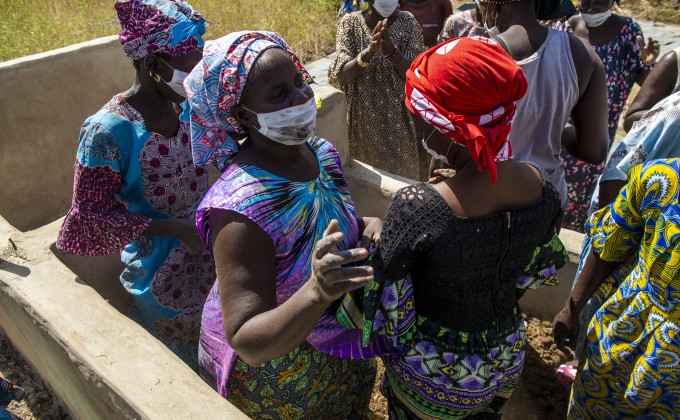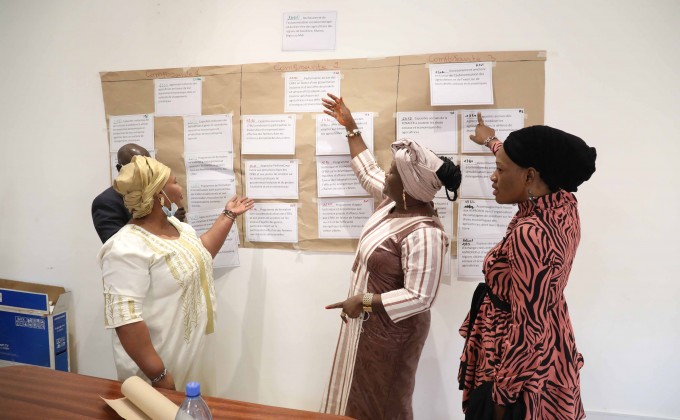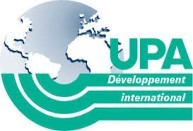
Mali in the regions of Koulikoro, Sikasso and Segou

March 2021 to February 2026

80 grassroots cooperatives
9,350 households directly involved in the project
13,100 households reached by the project
105,655 people reached by the project

Directions régionales de l’Agriculture (DRA)
Les Directions régionales de la Promotion de la Femme, de l’Enfant et de la Famille,
Les Directions régionales du Développement social (tutelle des coopératives)
Chambres régionales d’AgricultuZXXre (CRA)
Associations Professionnelles des Femmes Rurales (ASPROFER)

17 368 644 $


The Dou Touloma project follows the Feere-Diyara project, implemented by the International Agricultural Alliance (AAI), a consortium formed by CECI, SOCODEVI and UPA Développement international.
This project begins in a rather challenging context characterized by the COVID-19 pandemic and a socio-political crisis in Mali. The Dou Touloma project aims to improve the socio-economic empowerment and well-being of women farmers in the regions of Koulikoro, Sikasso and Ségou in Mali. At the end of the project, Dou Touloma aims to support women and girls to become autonomous, that is, free from all forms of violence (physical, psychological, social and cultural), to have the knowledge and skills, to have sufficient productive resources to develop their businesses and to be able to position themselves with dignity as actors and agents of change who can act for their own development.
To achieve its objectives, Dou Touloma draws on the experience of the Feere-Diyara project and on the unique and complementary capabilities of the three consortium partners in the fight for change. In fact, the previous project's experience demonstrated that work in favour of gender equity and balance must be done with great sensitivity. The strategy inspired by this previous experience includes work to strengthen the capacities of local cooperatives, and particularly those of women. Focusing on local cooperatives, there will be an opportunity to reach out directly to women in rural communities and to create a space where their voices can be heard in the debate. Finally, the project will establish strategic bridges and alliances with other projects and partners that work for the well-being of women and girls in order to further strengthen its impact and ensure sustainability of its results.
In order to empower women farmers, the project will have to overcome the lack of technical skills and knowledge, resources and control, as well as the attitudes, behaviours, customs and socio-cultural norms that constrain their options and their power to act freely and without fear. To this end, the project will strengthen the capacity of women farmers to access and use the economic and productive resources of their agricultural enterprise within the framework of climate change, and to manage and control these resources in order to improve their economic situation.
As was observed during the consultations, women are still very underrepresented in the decision-making bodies of the unions involved in the project and in the volume of business: despite constituting 51% of the members of the chosen unions, they only account for 25% of the managers.
This significantly undermines their ability to defend their specific interests and weakens their collective voice. In addition to this lack of inclusive governance, CFBUs also face significant administrative, planning, financial risk management and environmental challenges. In this context, the Dou Doloma project will strengthen the capacity of 80 CFBUs to improve women's participation, leadership and effective representation in the unions' decision-making bodies, as well as their ability to offer products and services that are accessible and adapted to the specific needs of women farmers and to the weather and environmental challenges they face.
In order to create a favourable environment for the empowerment of women farmers and the exercise of their social and economic rights, Dou Touloma will reinforce the capacity of the Professional Association of Rural Women (ASPROFER) to mobilize women farmers to defend their social and economic rights. In coordination with the Muso Ya project, the Dou Touloma project will reinforce the capacity of the National Federation of Rural Women (FENAFER) to defend the social and economic rights of women farmers. This federation constitutes a strong network of solidarity and mobilization of rural women and has a powerful potential for social and political change.
The Dou Touloma project is implemented by the Alliance Agricole Internationale (AAI), a consortium formed by CECI, SOCODEVI and UPA Développement international, with financial support from Global Affairs Canada.
Project figures
Number of people trained on climate-smart production and transformation practices, self-esteem, gender equality.
Number of women trained in leadership and entrepreneurship
Number of men trained on gender co-responsibility
Number of women cooperative members supported in the literacy program
Number of people trained on good practices in inclusive governance, financial and environmental management.
Number of people sensitized on women's rights to access productive agricultural resources



